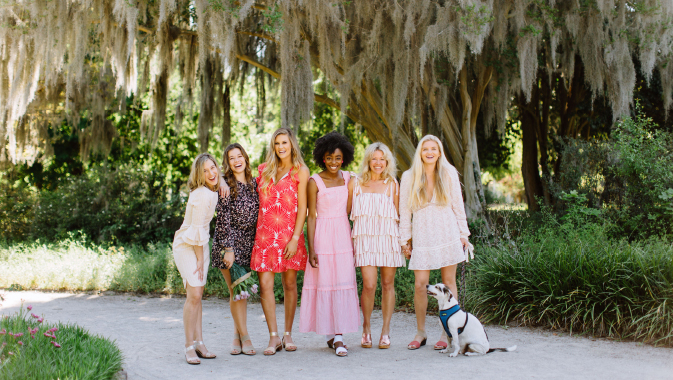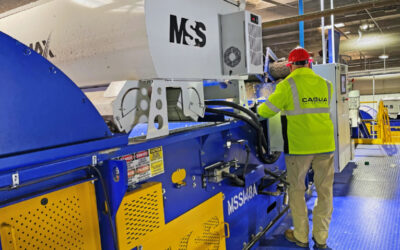Neely Powell began designing shoes roughly twenty years ago and entered into the retail business a decade later with her first store. That store, Charleston Shoe Co., provides comfortable, versatile, unique, fashion-forward, comfortable shoes that are machine washable and creatively designed.
All of the company’s shoes are hand-made by people who incorporate the use of sewing machines – something that is becoming a lost art these days. The company’s eighty artisans skillfully hand-make its shoes to create unparalleled comfort.
It all began during a summer vacation to central Mexico when Powell established a partnership with a well-known cobbler and imported his simple, comfortable sandals to the United States while attending the College of Charleston. “I was actually running his shoes through furniture markets because I thought that there was a need for a comfortable shoe that people can wear walking in all of those trade shows every day. I started selling his shoes underneath tables at furniture shows, and by the time I got out of college, I had over three hundred wholesale accounts,” says the company’s founder and chief executive officer.
After ten years of wholesale and collaboration with her cobbler in Mexico, Powell decided to go back to school and take a shoe design program at the Savannah College of Art and Design. Upon graduation, she launched her own shoe line with the same cobbler and began opening retail stores. “Now, we’ve gone from one cobbler to eighty cobblers; we produce about ten thousand pairs a week, and it’s been a crazy ride.”
The company now owns and operates twenty-six retail stores across the country, sells to approximately four hundred other retailers, and runs a good-sized e-commerce business that includes selling products on television shopping network QVC.
Here, challenges are seen as the necessary building blocks of business growth. The company has dealt with its fair share of problems throughout its history, but each challenge has resulted in a positive change. “Things definitely get hairy along the way, but I think that’s when you also have a huge opportunity to grow your business and really pull on the bootstraps and learn more about what’s going on,” says Powell. The issues that arise stimulate the company’s knowledge, involvement, and attention to detail.
In the end, even the most disastrous obstacles have taught Charleston Shoe to develop more sustainable methods to run the business. For example, in its early years, a bookkeeper embezzled half a million dollars from the company, and Powell was not able to keep up with expenses. Luckily, it was the beginning of the trunk show season, and this timing allowed her to pack a van and venture out to sell enough shoes to keep the business in operation.
After one month, that goal was met, and the company had proven to be a creative problem solver. Charleston Shoe now attends approximately 100 trunk shows a year. “Sometimes, you have to creatively come up with new ways to look at a problem, and that’s what I continue to try to do every day,” explains Powell.
Retail sales are on the decline in certain markets as a result of e-commerce, but the company aims to bring back the thrill of traditional shopping. The shopping experience in a store is vastly different today than it was for previous generations. “When I was growing up, it used to be a big thing for me to go shopping with my grandmother and go to her department store where all the sales associates knew her. It was fun, and you enjoyed the actual experience of shopping,” says Powell.
In some places, shopping has become an awkward, forced encounter between people who avoid eye contact during the transaction. Charleston Shoe aims to change that and bring back the traditional shopping experience. “It’s really why I have so many stores because I think it’s super important not only to showcase our product and allow people to try things on, but to experience our culture and the way we communicate to the customer and explain who we are as people.”
The company focuses on making shopping adventurous and fun instead of a hassle and hopes its customers feel as though they are walking into their best friend’s closet.
It creates soles that look like natural materials such as wood or raffia but are made from polyurethane. “We create them to look like a natural sole, but in fact, they are rubber, and so they are more comfortable. They are great for your knees and your back, and they are like walking on air or a tennis shoe, yet they provide the look of something that is more fashion-forward,” describes Powell. In addition to comfort and style, the majority of the company’s shoes are conveniently machine-washable.
The one-of-a-kind shoe design from Charleston Shoe attracts both its customers and onlookers. Many customers have similar stories of being stopped by a random passer-by who asks about her shoes or of meeting a woman at a dinner party who suggested strangers try on her shoes to feel the comfort. Powell describes the comfort as ‘Spanx for your feet’ because the upper portion of the shoe has the elasticity to hug the foot snugly. “It’s just very forgiving and allows for any width or any issue from bunions to hammertoes, narrow feet to wide feet, so it’s super accommodating as well.”
If a customer has grown to love a particular pair of shoes from Charleston Shoe, they likely have multiple colors from which to choose. This is a rarity in the shoe industry because overseas mass production operations give less opportunity for variety. “When you walk into one of my stores, it’s kind of a merchandising overload. You see one shoe in about fifty colors. It’s amazing.” The new line of shoes coming this Spring 2020 will have an exceptionally fun and whimsical design, some featuring cute ruffles.
In addition to its footwear, the company has a passion for charitable work, and it is particularly invested in providing relief efforts after natural disasters like Hurricane Dorian. Since Powell grew up in the Florida Keys and is familiar with hurricanes in this region, she asked some friends on the ground in the Abaco Islands in the Bahamas what supplies were needed. Their request was for shoes because the people left in the area were working to rebuild, and many were doing so barefoot or in flip flops. The company had two hundred steel-toed work boots made, and approximately two months ago, these were shipped to Marsh Harbour, a town in the Abaco Islands.
Charleston Shoe also supports a variety of non-profit organizations through its participation in non-profit trunk shows, allowing the company to donate between fifteen and thirty-five percent of its proceeds.
There are 150 employees in what the company refers to as its ‘shoe family,’ and it hosts a fun retreat for all of the corporate managers in Charleston, South Carolina every year. It brings them together to take part in meetings, sales training exercises and team-building activities like scavenger hunts. This year, the retreat will have forty attendees, which is exciting as the previous year had twenty-five participants, and this demonstrates the company’s growth.
“We’ve grown between twenty-five and fifty percent every year for the last five years,” explains Powell. “This year alone, we’ve opened ten stores which doubled our retail footprint in the past three years, and our production has gone up tremendously.”
Neely Powell is always trying to inspire entrepreneurs, particularly other women, to have the courage to follow their dreams just as she has.
The company’s plan for the future is to continue building stores and to serve more of the footwear needs of the medical and hospitality sectors. It is only logical for Charleston Shoe to expand into a professional market with a comfortable shoe that is machine washable and people can wear to work every day, specifically in these professions where people spend hours on their feet.













